Newsletter
Weibo Watch: The Paris Syndrome
Post-pandemic travel disillusionment to the ‘Unkillable One from Shijiazhuang’, an overview of noteworthy and trending topics on Weibo and beyond.
Published
1 year agoon

PREMIUM NEWSLETTER | ISSUE #11
This week’s newsletter:
◼︎ 1. Editor’s Note – The Paris Syndrome hits close to home
◼︎ 2. What’s Trending – A closer look at the featured stories
◼︎ 3. What to Know – Highlighting 8 hot topics
◼︎ 4. What Lies Behind – Raincheck for next week!
◼︎ 5. What’s Noteworthy – Rumored fall of Zhongzhi Enterprise
◼︎ 6. What’s Popular – How the TFBoys boosted Xi’an economy
◼︎ 7. What’s Memorable – Looking back: Swedish Chinese tourist gate
◼︎ 8. Weibo Word of the Week – “The Unkillable One from Shijiazhuang”
Dear Reader,
Half a year after China reopened its borders and around four months after resuming the issuance of tourist visas, there is much discussion surrounding the low number of foreign tourists traveling to China. The proportion of tourists from Europe, the U.S., Japan, and South Korea has significantly dropped.
As more incentives are introduced that might attract more inbound international visitors, such as making it easier for some foreigners to obtain visas upon arrival and letting travelers link their Visa and Mastercard accounts to Alipay and WeChat Pay, many still argue that there are numerous issues hindering smooth travel in China for foreign visitors. A recent report by Wall Street Journal suggested that visitors are staying away because of deteriorating relations between China and the West, but recent viral Twitter posts also highlighted practical reasons, including troublesome visa processes, challenges with digital payments in a cashless society, the Great Firewall, certain hotels not accepting foreign guests, and difficulties encountered when services require Chinese ID cards.
While closely following these tweets, we’ve also noticed a trend on Chinese social media regarding outbound travel to Europe during the same period. Earlier news reports had already mentioned that Europe is experiencing lower-than-expected bookings from high-spending Chinese travelers, and the anticipated ‘Chinese travel boom’ hasn’t materialized. For most Chinese citizens, traveling abroad has become difficult (securing visa appointments for some destinations is almost like a lottery) and more costly. Simultaneously, domestic tourism has become more popular and attractive than ever before, making Chinese holidays a preferred choice.
Consequently, those travelers who finally reached their destinations in Europe recently might have overcome some considerable obstacles to get there. But a recent surge in Europe-related posts within China’s travel-focused social media sphere indicates that for many Chinese travelers, their European adventures turn out to be quite underwhelming.
The phenomenon known as ‘Paris Syndrome’ describes the sense of extreme disappointment some individuals feel when visiting Paris, finding that the city doesn’t match their expectations due to the reality not aligning with the romanticized scenes from movies. While the term originated in the 1980s, typically applying to Japanese tourists experiencing culture shock in Europe, many recent accounts from Chinese travelers also express disillusionment with their European experiences.
Why? The most frequently mentioned reason is that they view Europe as “messy,” “chaotic,” and deficient in public safety to the point that travelers caution each other against going out at night. Many posts on social media recount incidents of theft in cities such as Paris, Amsterdam, Barcelona, and Rome, leaving individuals feeling helpless when they discover that the police couldn’t provide sufficient assistance. Some have even shared experiences of being robbed twice during a single trip, leaving them fearful and disheartened. As a result, Chinese popular Xiaohongshu app is filled with guides and tips on “how not to get robbed in Europe,” recommending special safety bags, hotel room locks, and additional luggage protection. However, some commenters suggest that the joy of traveling is ruined for them if going to European cities means one must prepare to be vigilant at all times and assume that “thieves are all around.”
Observing frustrated international travelers’ Twitter posts in China and the emotional posts from Chinese travelers in Europe, it seems that many of us are experiencing some form of the ‘Paris Syndrome’ recently. Especially during the Covid years, we built up our hopes about that one big trip we were going to make – surely it was going to be the best trip of a lifetime? But we get pickpocketed, we get denied at hotels, we get lost in translation, and we inescapably get disappointed.
Just recently, atop an ancient Chinese pagoda in Zibo, I shared tea for two with another solo traveler – a young teacher from northern China. As I mentioned being from Europe, he shared his hesitation about going there: “I’ve been hearing how unsafe it is for Chinese recently.” After an enlightening conversation, he confided that I was the first foreigner he had ever spoken to. Later, on another train, I received a message from an old friend in Paris who had seen one of my travel photos. He wrote: “You’re traveling in China all alone now? I’ve been hearing how unsafe it is for foreigners recently.”
An upside amidst the negative travel news regarding both Europe and China is that our expectations are lowered. Perhaps we can avoid the Paris Syndrome by venturing out ourselves and discovering that the rewards of travel are usually more meaningful than the disappointments. Breaking barriers and cultural distances entails getting closer to each other – quite literally. So, I expressed my hope to the young teacher I met in Zibo, that he would still decide to explore Europe. Similarly, I hope that China will be able to welcome more international visitors in the near future.
Read more about Chinese travelers’ experiences in Europe in our latest featured post. Zilan Qian and Ruixin Zhang contributed to this newsletter. If you’re still heading out this summer, I wish you happy, safe travels and meaningful experiences.
Best,
Manya (@manyapan)
What’s Trending
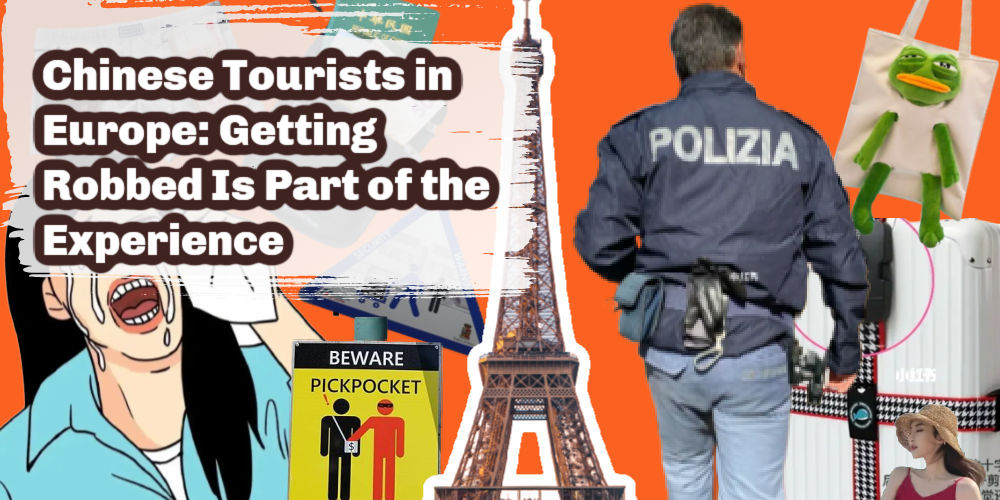
1: Chinese Robbed in Europe | My bag was stolen in Amsterdam, my phone was snatched in Paris, and my camera was robbed in Rome. Chinese social media is brimming with accounts from Chinese travelers sharing their unfortunate experiences of falling prey to theft during their trips to Europe. Getting robbed in Europe has become so common that Chinese apps like Xiaohongshu and Douyin are now flooded with numerous “Europe Anti-Theft Strategies” and “How Not To Get Robbed in Europe” guides.
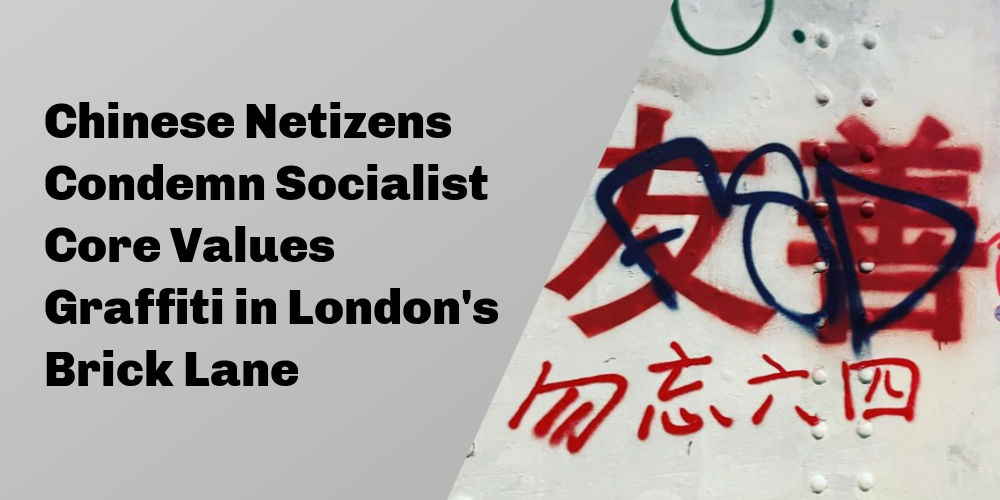
2: Brick Lane Graffiti | In London’s Brick Lane, a wall covered with Chinese slogan graffiti sparked backlash from local art communities and Chinese diaspora recently, with many perceiving the graffiti as a show of support for the Chinese Communist Party. While some voices in China’s social media sphere defended the graffiti, many others condemned the makers for being disrespectiful and arrogant.

3: Milky-Spicy Trend | Some parents think it’s cute, others think it is funny. Dressing children in tight dresses and grown-up attire has evolved into a trend that is mostly visible on Chinese social media. An entire online economy has developed around the ‘Milky-Spicy Trend,’ which is embraced by some parents highlighting its innocence while disregarding potential negative consequences. But recently, Chinese media outlets and social media commenters are pointing out the dangers behind the trend.
What to Know

Haohuanluo noodles have made it to space.
◼︎ 1. China’s among Countries with Lowest Birth Rates. The problem of China’s super low birth rates is not going to solve itself any time soon. A renowned professor of demography, Yuan Xin, made headlines this week for pointing out that China has become one of the countries with the lowest birth rates globally, projecting that China’s negative population growth will continue well into the 2070s. China’s expected number of birth rates for 2023 is 7-8 million, which is another record low. Just 12 million babies were born in 2020 (8.5 births per thousand), 10.6 million babies were born in 2021, and the latest number, published in January 2023, indicated that 9.56 million people were born, while 10.41 million died. 2023 would therefore see the lowest birthrate yet. (Various related trending hashtags on Weibo, one of them being ‘China Now among Countries With Lowest Birth Rates Globally’ #中国已成为全球生育率最低的国家之一#, 200 million views).
◼︎ 2. Xi’an Flash Floods. The village of Weixiping, Xi’an, saw a huge mudslide and flash flood on August 11, triggered by heavy rain. Local authorities set up a major rescue campaign, involving nearly 1000 team members including search & rescue experts and firefighters. According to the latest reports, 21 people died and 6 people are still missing. (Weibo hashtag “21 People Confirmed Dead in Xi’an Mud Slides” #西安泥石流已发现21名遇难者#, 5.8 million clicks; “Still 6 People Passing after Xi’an Landslide #西安泥石流灾害仍有6人失联#, 28+ million clicks).
◼︎ 3. Third Covid Wave. There has been a surge in social media posts this week about Covid infections and a third Covid wave in China. While one after the other posts photos online of their positive tests, one popular comment on Weibo said: “I’ve never had Covid yet, can you believe it?!” (Weibo hashtag “People Testing Postive for Covid for 3rd Time Emerging One by One” #
#新冠三阳的人开始陆续出现##, 450 million clicks)
◼︎ 4. Health Care Corruption Campaign. Recently, China had intensified its crack down on corruption in the health care system, triggering many discussions this week. The campaign, which aims to restore public trust in the medical sector after the pandemic, has already resulted in 168 hospital bosses being nabbed, as reported by South China Morning Post on Sunday. The newspaper further reported that at least two major pharmaceutical firm executives are now under investigation. We’ll report more on this topic as it keeps fermenting online. (Hashtag “Pharmaceutical Representatives Bribing Doctors” #医药代表性贿赂医生#, 520 million views).
◼︎ 5. Hebei Floods Aftermath. The aftermath of the devastating floods in Hebei has remained a prominent topic of discussion this week. For those affected, this might be the most challenging period as some return to find their homes in ruins. As the affected individuals strive to recover, heartening stories on social media showcase people coming together to provide support during this crucial time. For example, those local businesses going the extra mile to supply local schools with new books, or the supermarket in Zhuozhou that’s offering credit for purchases. According to the latest reports, Hebei may need two years to carry out post-flood reconstruction. (Various hashtags).
◼︎ 6. China’s Booming Vehicle Export. This week, reports surfaced that in the first half of 2023, China has overtaken Japan to become the world’s leading vehicle exporter. According to the China Association of Automobile Manufacturers, Chinese auto manufacturers exported 2.34 million vehicles globally from January to June, marking an impressive year-on-year increase of nearly 77 percent. (Various related hashtags, including “China World’s Biggest Exporter of Automobiles in First Half of 2023” #中国半年度汽车出口量居世界第一#, 480,000 views.)
◼︎ 7. Noodle Rocket. Haohuanluo (好欢螺) Snail Noodles, a famous Chinese noodle brand, successfully launched commercial rocket Ceres 1 on August 10 from the Jiuquan Satellite Launch Center in northwestern China’s Gobi Desert, sending seven satellites into planned orbit. Obviously, it was not actually the noodle brand that launched it, but sponsored it, although its social media campaign would make you believe otherwise, with many netizens being surprised that their fav noodle brand made it to space. (Hashtag “Successful Launch of the Haohuanluo Rocket” #好欢螺号火箭发射成功#, 250 million clicks).
◼︎ 8. Return of the Tour Groups. While Chinese tour group trips had already resumed to certain countries in the post-zero-Covid era, China’s Ministry of Tourism made an announcement on August 10th, stating that the resumption of tour groups to additional countries and regions will take place. This now encompasses countries such as Japan and the US, broadening the spectrum of foreign destinations from 60 to 138. The Ministry also reminded outbound tourists to be well-prepared before each journey – which might include checking up on those ‘how not to get robbed in Europe’ guides!
What’s Noteworthy
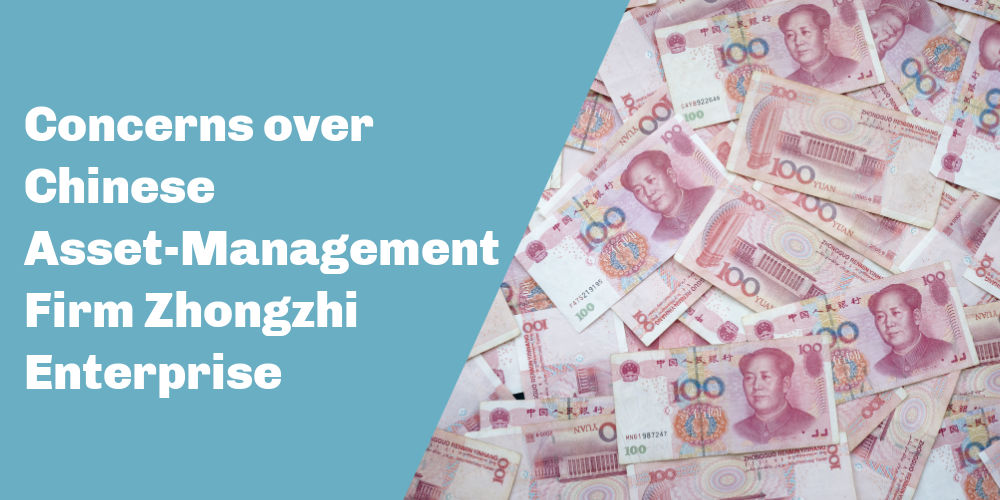
Photo by Eric Prouzet
Rumored Collapse of Zhongzhi Enterprise Group |
Recently, a financial advisor from the third-party wealth management company Hengtian Wealth made a public admission about a potential financial crisis which is said to have unfolded after the Chinese asset management firm Zhongzhi Enterprise Group allegdly failed to meet its loan repayment obligations, affecting around 150,000 individual investors who had collectively invested over 3 million RMB (approximately 416,000 USD). The crisis is estimated to involve a staggering amount of 230 billion RMB (about 32 billion USD), and the largest investment by a single client exceeded 5 billion RMB (approximately 692 million USD).
These rumors sparked concerns in the financial world, triggering strong reactions from both investors and the general public. Meanwhile, the Zhongzhi Group has halted all fundraising and repayment activities. Once a trillion-dollar empire built over decades, the Zhongzhi Group, which controls Zhongrong International and a handful of listed companies, now faces a potential collapse, representing a stunning downfall for a previously respected financial institution.
In response, many netizens have commented with the phrase “poverty spared me from a disaster” (“贫穷使我逃过一劫”), as most investment thresholds start at 3 million RMB (416,000 USD), which they could not afford. While the default might temporarily spare most individuals, some netizens have pointed out that the dynamics playing out among the wealthy could ultimately harm those at the bottom. As of now, there has been no official confirmation from Zhongzhi regarding the widely circulated information. Discussions surrounding this matter on Weibo have been subject to censorship, with numerous netizens reporting instances of their posts being flagged by the company and subsequently removed.
What’s Popular
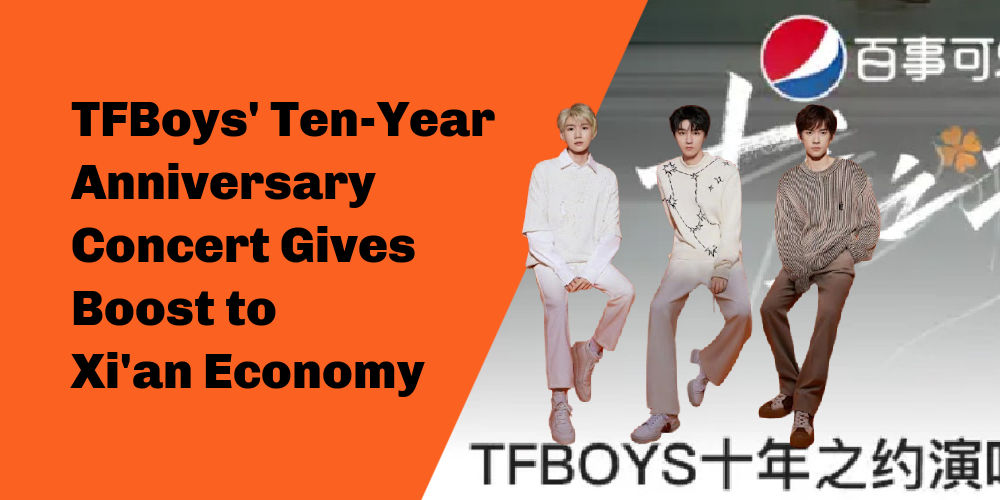
TFBoys Concert Rocks Xi’an | You might remember from our last Weibo Watch newsletter that the immensely popular Chinese pop group, TFBoys, created quite a stir within their fan community when they initially released tickets for their two-hour concert in Xi’an on August 6th, marking the band’s ten-year anniversary and their first live show since 2020.
The event unfolded with a certain degree of chaos and disorder (with reports of fainting fans and overwhelmed security personnel). However, recent news reports suggest that the concert has brought about numerous positive impacts for Xi’an, delivering a significant boost to the local economy. The revenue generated from ticket sales amounted to a staggering 35.76 million yuan (almost 5 million USD), consequently propelling the city’s tourism revenue to an impressive 416 million yuan (57 million USD).
In comparison to the same period in the preceding year, online bookings for accommodations in Xi’an surged by an impressive 738%. Notably, almost half of the TFBoys’ fans not only attended the concert but also took the opportunity to explore some of Xi’an’s scenic attractions. The fact that a single concert can trigger such a significant increase in tourism revenue underscores the triumph of the TFBoys. Debuting as one of China’s pioneering boy bands, the trio’s popularity remains steadfast and impactful.
What’s Memorable
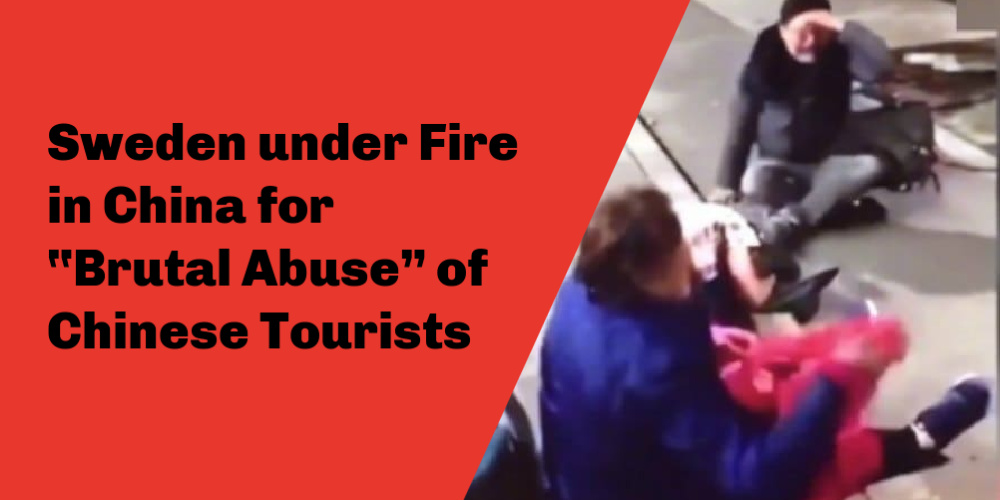
“This is killing!” incident | We already touched upon the ‘Paris Syndrome’ phenomenon in this newsletter, but the Sweden incident took things a step further – we might even liken it to a Stockholm Syndrome if the term weren’t already associated with something else. This incident became one of the most prominent topics on Chinese social media in 2018: the alleged mistreatment of a Chinese family in Stockholm during September ’18 ignited major discussions on Chinese social media, and even led to the Chinese Embassy in Sweden issuing a safety alert for Chinese tourists visiting the country.
The incident made headlines after bystander videos were posted on Chinese social media showing how a Chinese man was dragged out of a hotel by Swedish police, screaming “This is killing, this is killing!” It later showed his family members crying on the street outside of the hotel. Despite the family’s initial assertion of being subjected to severe mistreatment by the hotel without any valid cause, subsequent information revealed that the Chinese tourists had arrived significantly ahead of the designated check-in time and had chosen to remain in the hotel lobby. Nonetheless, this incident escalated to such an extent that it triggered a diplomatic dispute between Sweden and China.
Weibo Word of the Week
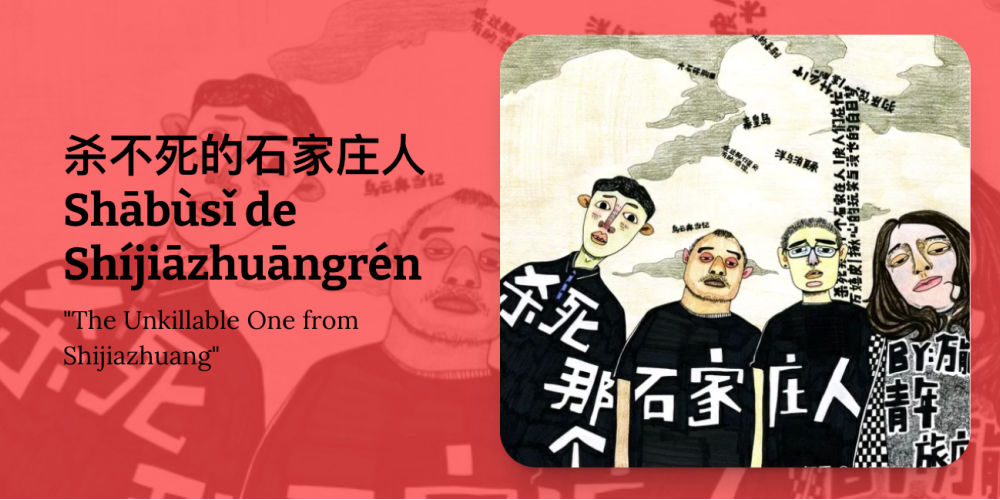
“The Unkillable Shijiazhuang Guy” | Our Weibo Word of the Week is actually a phrase this time, namely 杀不死的石家庄人 (shābùsǐ de Shíjiāzhuāngrén), which translates to “The Unkillable One from Shijiazhuang.” This phrase has gained popularity among netizens recently as a way to express sarcasm.
Shijiazhuang serves as the capital and the most populous city of China’s Hebei Province. “The Unkillable One from Shijiazhuang” (杀不死的石家庄人) is actually a song released in 2022 by the local Hebei Communist Youth League. It serves as a ‘harmonious’ reinterpretation of the renowned 2010 Chinese song “Kill the One from Shijiazhuang” (杀死那个石家庄人) by the Chinese rock band Omnipotent Youth Society. The original song, which delved into the consequences of the planned economy in northern China and the turbulence stemming from widespread job losses, deeply resonated as a shared memory among an entire Chinese generation.
The adapted song title has since been employed by Chinese netizens to express sarcasm, partly poking fun at the Communist Youth League’s attempt to revise a song that once conveyed hardship into one echoing state propaganda. The song’s renewed attention stems from Shijiazhuang’s recent declaration to transform itself into a “Rock N Roll Center,” adopting the slogan “The Unkillable Shijiazhuang.”
This move has been met with an incredulous response from the public, leading to a surge of imaginative adaptations online. These creative reinterpretations humorously reflect individuals’ resilience within a constrained cultural and social environment – a skillful form of self-deprecating expression. As one netizen eloquently summed it up: the previous generation experienced unemployment, the current generation is grappling with it, access to esteemed universities became harder, and now even our city’s anthem has been altered. Despite it all, I continue to reside in Shijiazhuang – this is the true essence of being “the unkillable one from Shijiazhuang!”
This is an on-site version of the Weibo Watch newsletter by What’s on Weibo. Missed last week’s newsletter? Find it here. If you are already subscribed to What’s on Weibo but are not yet receiving this newsletter in your inbox, please contact us directly to let us know.
Stories that are authored by the What's on Weibo Team are the stories that multiple authors contributed to. Please check the names at the end of the articles to see who the authors are.

Also Read
Featured
Weibo Watch: A New Chapter
About balloons, drone dragons, changes coming to What’s on Weibo, and much more.
Published
13 hours agoon
January 7, 2025
PREMIUM NEWSLETTER | ISSUE #42
This week’s newsletter:
◼︎ 1. Editor’s Note – A New Chapter
◼︎ 2. What’s New – A closer look at featured stories
◼︎ 3. What’s Trending – Hot highlights
◼︎ 4. What’s Noteworthy – A strange record
◼︎ 6. What’s Popular – Jackson Yee’s stellar performance
◼︎ 7. What’s Memorable – Looking back at the 10 most-read stories of 2024
Dear Reader,
From Hangzhou to Wuhan, the New Year in China was celebrated with the release of thousands of balloons at midnight in cities across the country. In Hangzhou alone, approximately 70,000 people attended the New Year countdown celebrations, with some bloggers estimating that street vendors sold at least 20,000 balloons in one night. In Nanchang, the capital of Jiangxi province, thousands of people also released balloons in the city center, resulting in stunning crowd videos (see here).
While a sky filled with balloons makes for some spectacular images and footage, adding to the festive sphere, there are also worries about this contemporary ‘tradition.’
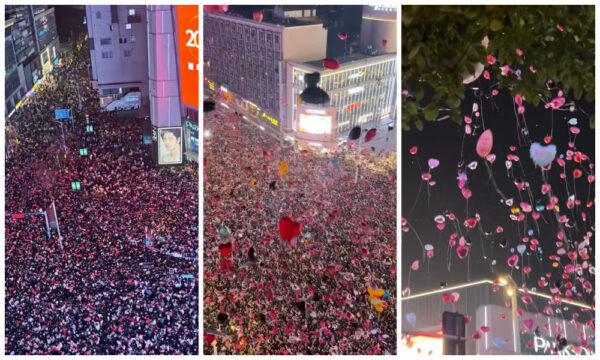
The Nanchang balloon moment at midnight.
The sight of tens of thousands of people gathering in city centers, such as in Nanchang, has triggered discussions about the dangers of unexpected incidents leading to panic, potentially causing stampedes like the tragic event in Shanghai a decade ago.
Beyond crowd safety, the release of thousands of balloons introduces another serious risk. Hydrogen-filled balloons (hydrogen is often illegally used in balloons because it’s cheaper than helium) are highly flammable, and contact with high-voltage lines or open flames can lead to explosions and hazardous situations. One such incident occurred in Xinyang on New Year’s Eve, when balloons exploded at the crowded entrance of a shopping mall (video). In Hangzhou, a 22-year-man was arrested at the scene for setting off fireworks in Hangzhou during the balloon release festivities, also causing local explosions.
And then, there are concerns about the environmental impact. The balloon release festivities in Hangzhou alone resulted in an estimated six tons of garbage being left behind, making the cleanup a massive and costly undertaking. While sanitation workers are mobilized to tackle the mess, many balloons end up caught in trees, tangled in bushes, or drifting so far that they’re beyond the reach of cleanup crews. The sheer amount of plastic waste left behind has sparked online discussions, with many questioning the environmental consequences of these celebrations.
So what’s the alternative?
This year, you might have seen a viral video of an impressive drone show supposedly held on the Bund in Shanghai, featuring a dragon formed by dozens of drones dancing in the night sky, crowned by a circle of fireworks. The video went viral across Instagram, TikTok, Facebook, and X. Even Elon Musk liked the video, tweeting his “wow” comment: look how China celebrates the New Year!
The video, however, turned out to be fake. In fact, there was no show for New Year’s at the Bund at all.
The video creator combined elements from various other videos, including a drone light show featuring a majestic dragon that took place in Shenzhen on October 1st, marking the 75th anniversary of the People’s Republic of China (video).
The glowing circle in the sky was from a firework and AI show held in Liuyang, Hunan, on December 7, titled “Tears of the Gate of Heaven” (天空之门的眼泪). The falling lights symbolized tears from heaven and were designed by a local firework company boss to commemorate his late mother (video).
Upon further research, I found that the Liuyang show had inspired a series of edited videos, placing the Liuyang show highlight in different locations, with each version more spectacular than the last (see examples). As reported by Annielab, there are even online tutorials teaching netizens how to digitally insert the Liuyang ‘gate’ into different backgrounds with the Jianying (剪映, aka Capcut) editing app.
What began as an online meme (“I haven’t been to the Liuyang show, but I can bring it to my town”) eventually resulted in the viral video combining the Shenzhen and Liuyang shows against the backdrop of the Bund. For the quick scrollers, it apparently was so realistic that even Elon Musk thought it was genuine.
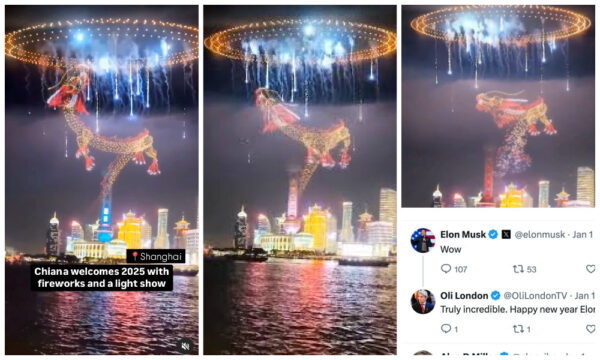
Stills from the fake drone dragon video.
The fake drone dragon New Year video is interesting for several reasons. It highlights how quickly fake news about China spreads across social media, with few questioning the authenticity of viral posts—even when they’re shared with millions of followers. We’ve seen this pattern before, with stories about the social credit system, a supposed Xi Jinping chatbot, and heavily edited cyberpunk-style Chongqing scenes.
These trends often repeat themselves, portraying China in extremes: either as a futuristic utopia or a dystopian threat. They go viral because they serve as clickbait, used by both hostile “anti-China” accounts and propaganda-heavy “pro-China” accounts to push their narratives—look how great China is or look how scary China is.
The dragon video, though fake, also underscores China’s role as a global tech power. Its components—real drone and AI shows in Liuyang, Shenzhen, and other cities—demonstrate just how advanced the technology has become, to the point where reality and fabrication are increasingly difficult to distinguish.
It’s just a video, but it points to something bigger: the lack of understanding about what is actually happening in China. Whether it’s about China’s digital space or society at large, most people don’t take the time—or simply don’t have the time—to look beyond the surface of fast-moving stories. This tendency risks amplifying misconceptions. Before you know it, you might retweet a fake dragon video, interpreting it as evidence of a powerful or intimidating China, without realizing it’s part of a broader grassroots trend that’s misunderstood—or missing the fact that, for now, far more balloons than drones still rise into the skies during New Year’s celebrations.
Before I wander off with the balloons, what’s the takeaway? As we step into 2025, with AI playing an ever-growing role on social media and global influencers shaping the news we consume—often with their own agendas—it’s more important than ever to examine the stories we amplify critically. Only by paying attention to the details can we truly understand the bigger picture.
Announcing some changes to What’s on Weibo
This brings me to an exciting new chapter for What’s on Weibo and how I see the future of the site. The China-focused global news environment has evolved significantly since I first started this platform. There’s now an increased focus in mainstream media on China’s social media trends, and niche China-related news has become accessible to many thanks to innovative tools at our fingertips. While there’s more information than ever, it’s also becoming increasingly chaotic and fleeting.
As a smaller, independent voice in this fast-paced and crowded media arena, I’m committed to offering you unique and meaningful insights into Chinese society and digital culture that you won’t find anywhere else. In this video, I’ll explain the changes coming to the site, introducing What’s on Weibo Chapters. In these turbulent, dragon-drone times, I hope you’ll appreciate this new chapter for What’s on Weibo.
Our first Chapter, of course, is “15 Years of Weibo,” reflecting on the platform’s evolution since its launch in 2009 and its role in China’s competitive social media ecosystem today. We’ll explore the most popular influencers on Weibo, go deeper into Weibo diplomacy aka ‘Weiplomacy’, and will feature a special contribution by an expert guest writer. More on that coming soon!
A shout-out to Miranda Barnes and Ruixin Zhang for helping select some of the topics for this newsletter, and a very special thanks to Wytse Koetse for filming and editing the What’s on Weibo Chapters video.
Stay tuned!
Warm greetings,
Manya Koetse
(@manyapan)
What’s New

Our picks | From ‘Chillax’ to ‘Digital Ibuprofen,’ this compilation of ten Chinese buzzwords and catchphrases by What’s on Weibo reflects social trends and the changing times in China in 2024.
What’s Trending
🏚️ Earthquake in Tibet
The devastating 7.1 magnitude earthquake that struck Shigatse’s Tingri County high on the Tibetan plateau on the morning of January 7th has already claimed the lives of at least 95 people and left over 130 injured. Approximately 6,900 people reside in the villages surrounding the earthquake’s epicenter. On Weibo, videos reveal the catastrophic impact of the earthquake, with entire neighborhoods reduced to rubble.
Shigatse City’s Deputy Mayor Liu Huazhong (刘华忠) appeared visibly emotional as he announced the latest death toll and shared that 14 townships have been severely affected by the disaster. At the time of writing, the government has activated the highest-level emergency response for disaster relief, with hundreds of rescue workers deployed to the affected areas to provide medical assistance, conduct search and rescue operations, and distribute emergency supplies.
🤒 Peak Flu Season
It’s peak flu season, and it’s evident in the various trending topics circulating on Chinese social media. As discussions grow about crowded hospitals, face masks, and flu medication, concerns about the rapidly rising rates of influenza viruses have also emerged. Currently, according to monitoring data from the Chinese Center for Disease Control and Prevention, over 99% of flu cases in China are identified as the Influenza A virus subtype H1N1 (“甲流”).
There have also been reports of an increase in flu-like human metapneumovirus (HMPV, 人偏肺病毒) infections in northern China, particularly among children under the age of 14. On social media, Chinese experts are largely addressing these concerns by emphasizing that HMPV is not the same as Covid-19, is less common compared to influenza and mycoplasma infections, and that the recent rise in HMPV cases is not unusual but rather reflects the typical higher prevalence of respiratory viruses during winter.
🏓 Chinese Table Tennis Superstars Withdraw from World Rankings
There has been a lot of buzz about the world of table tennis recently. After a tumultuous 2024 in which Chinese table tennis players shone at the Paris Olympics, super popular table tennis stars Fan Zhendong (樊振东) and Chen Meng (陈梦) announced on Weibo (post 1, post 2) their withdrawal from the World Rankings (WR) due to new fines imposed by the International Table Tennis Federation (ITTF) for players not participating in tournaments.
Fan wrote that the Paris Olympics had left him “mentally exhausted” and that the new rules imposing fines for not participating in tournaments left him no other choice but to withdraw entirely. He also said he would not retire yet and quoted the Wicked line, “It’s time to try defying gravity 💚.” That post received more than 2.8 million (!) likes. Likewise, Chen also wrote about the impact of Olympic stress and that she still needs time to recover.
The withdrawal of these major table tennis icons—veteran athlete Ma Long (马龙) later also announced his withdrawal—has ignited discussions and criticism over WTT’s mandatory participation rule and whether it merely serves commercial interests instead of protecting athletes. Liu Guoliang (刘国梁), president of the Chinese Table Tennis Association (CTTA), said he would press World Table Tennis to revise its rules.
🏛️ Verdict in Handan Schoolboy Murder Case
A case in which a young boy from Feixiang County in Handan, Hebei, was murdered by three classmates shocked the nation in March 2024. The young boy, Wang Ziyao (王子耀), had suffered years of bullying before his three classmates, all 13 years old, killed and buried him. Wang had been missing for one day before his body was discovered buried in a greenhouse in a field near the home of one of the suspects. The case attracted major attention at the time, not just because of the cruel crime, but also due to its legal implications. Since an amendment to China’s Criminal Law in 2021, children between the ages of 12 and 14 can be held criminally responsible for extreme and cruel cases resulting in death or severe disability, if approved for prosecution by the Supreme People’s Procuratorate (SPP).
Now, the court verdict has been reported by Chinese media. Two of the male defendants were sentenced to life imprisonment, while the third defendant was not legally punished due to his minor role in the crime but was still placed under “special correctional education.” The verdict has triggered discussions on its implications and how it should now be clear to minors aged 12 and above, and their parents, that they cannot escape severe punishment for extreme crimes.
🎬 Li Mingde’s Livestream Permanently Banned
The young Chinese actor Li Mingde (李明德), also known as Marcus Li, has been the center of attention on Chinese social media recently due to the drama surrounding the production of the Chinese TV series The Triple Echo of Time (三人行). In a Weibo post published on the night of January 4, Li, a supporting actor in the series, accused co-star Ma Tianyu (马天宇), the male lead, of displaying diva behavior on set. He also complained about the harsh filming conditions, alleging that he was made to wait in freezing temperatures wearing nothing but a t-shirt.
The production team has since issued a statement denying Li’s claims and turned the tables, accusing Li of being unreasonable, negative, and frequently late or leaving early during filming. They also confirmed that they had officially terminated their collaboration with him.
Adding to the controversy, Li Mingde’s livestream channel was suddenly shut down on January 7, with Douyin permanently banning his account. The platform cited “deliberately stirring controversy to attract attention” as the reason for the ban, sparking widespread discussion online. Li, who has over 7.6 million followers on Weibo, continues to post updates at the time of writing. After Ma Tianyu suggested in a now-deleted post that Li might be suffering from a mental illness, Li refuted the claim and stated he plans to take legal action. It seems this drama is far from over.
What’s Noteworthy

Did you know that the final Guinness World Record of 2024 was set by Chinese e-commerce giant JD.com? Honestly, the record is so unusual that I initially struggled to understand what the achievement was: JD.com now holds the Guinness World Record for the world’s “largest object unveiled” in Liangshan Yi Autonomous Prefecture, Sichuan, on December 29, 2024—a staggering 400.66 meters long.
Is it a rocket? A train? A cruise ship?
No, it’s actually a list of 173,583 authentic user comments—a 400-meter-long comment section reviewing the platform’s major home appliance products. JD.com, one of the leading players in China’s home goods and household appliances market, seems to have orchestrated this extravagant marketing stunt to emphasize its position as a trustworthy market leader with an alleged 98% satisfaction rate.

The 400+ meter list, via Digitaling.
As an online retailer, printing reviews and displaying them in an offline setting where virtually no one but Guinness World Records takes notice does seem wasteful. But here we are, talking about it—along with a trending hashtag (#24年最后一个吉尼斯纪录是京东的#), so I suppose the PR effort paid off.
What’s Popular

After the 2024 success of Her Story(好东西) directed by Shao Yihui (邵艺辉) YOLO (麻辣滚烫) by Jia Ling (贾玲), Like A Rolling Stone (出走的决心) by Yin Lichuan (尹丽川), we are now seeing another hit film by a female director, highlighting the growing prominence of female directors in Chinese cinema.
The hashtag for the new movie Little Me (小小的我) has received over a billion views on Weibo this week (#电影小小的我#), noting its popularity. The movie was directed by Yang Lina (杨荔钠), the female director also known for her film Song of Spring (妈妈), which tells the moving story of an 85-year-old mother caring for her 65-year-old daughter with Alzheimer’s disease.
Little Me again touches on profound themes as it tells the story of a young man suffering from cerebral palsy who nevertheless tries to find his own direction in life. The role is played by Jackson Yee (易烊千玺), the superstar with an enormous fanbase on social media. Although he is still known as the youngest member of the boyband TFboys, Yee has gone far beyond that and shows his talent and dedication as an actor in this film with a credible performance.
Although Jackson Yee’s standout performance in Little Me is praised across social media, some have also commented that the actor might be too good for the film. Qilu Evening News published a sharp movie review, noting that Yee’s performance creates a stark divide between his brilliance and the film’s otherwise mediocre quality. This disparity has led some viewers to comment that Little Me is “a dumpling made just for the vinegar” (“为了一碟醋包了一顿饺子”). Despite this criticism, the film is still scoring a 7.2 on the Douban platform, where it has been rated by over 164,000 people.
What’s Memorable

As we’re entering the second week of 2025, I’d still like to take this time to look back look back at 10 of the most popular stories on
What’s On Weibo of 2024 for this week’s archive lookback. From viral trends to shocking incidents, it was a tumultuous year with some moments that’ll be ingrained in China’s collective digital memory. 🧵👇
1️⃣🐱 When ‘Fat Cat’ Jumped into the Yangtze River | He invested all he had for a girl he’d met online. Then she broke up with him. The tragic story behind the suicide of a 21-year-old Chinese gamer nicknamed ‘Fat Cat’ (胖猫) became a major topic of discussion on Chinese social media in May of 2024, touching upon broader societal issues from unfair gender dynamics to businesses taking advantage of grieving internet users.
🔗
https://www.whatsonweibo.com/the-tragic-story-of-fat-cat-how-a-chinese-gamers-suicide-went-viral/
2️⃣✨ Chengdu Disney | How did a common park in Chengdu turn into a hotspot that got everyone talking? By mixing online trends with real-life fun, blending foreign styles with local charm, and adding humor and absurdity, Chengdu had the recipe for its very own ‘Chengdu Disney’ in 2024. Undeniably, the quirkiest trend of the year.
🔗
https://www.whatsonweibo.com/chengdu-disney-the-quirkiest-hotspot-in-china/
3️⃣💧 Nongfu and Nationalists | One of the most noteworthy online phenomena in China during 2024 was the big battle over bottled water after the death of Zong Qinghou (宗庆后), the founder and chairman of Wahaha Group (娃哈哈集团), the country’s largest beverage produce. What started as a support campaign for Wahaha morphed into a crusade against another major water brand, Nongfu Spring, led by online nationalists.
🔗
https://www.whatsonweibo.com/in-hot-water-the-nongfu-spring-controversy-explained/
4️⃣🔪 Beishan Park Stabbings | 2024 was, unfortunately, a year of many deadly mass attacks by individuals ‘taking revenge on society,’ from Zhuhai to Changde. One such incident that made headlines around the world was the June 10 stabbing at Beishan Park in Jilin, which left four American teachers injured, among others. While the story spread widely on X, it was initially kept under wraps on the Chinese internet. This article analyzes how the incident was reported, censored, and discussed on Weibo.
🔗
https://www.whatsonweibo.com/the-beishan-park-stabbings-how-the-story-unfolded-and-was-censored-on-weibo/
5️⃣🥇 Golden Olympics | The 2024 Paris Olympics were the talk of Chinese social media. Beyond the gold medal moments, there were plenty of happenings on the sidelines, at the venues, and on the award stage that went viral, sparking countless memes. From China’s cutest weightlifter to viral sensation Quan Hongchan, this top 10 list of meme-worthy moments was a favorite among readers.
🔗
Team China’s 10 Most Meme-Worthy Moments at the 2024 Paris Olympics
6️⃣🚗 Land Rover Woman | In 2024, ‘Land Rover Woman’ (路虎女) became the latest addition to the Chinese Lexicon of Viral Incidents. A female Land Rover driver sparked outrage among Chinese netizens with her entitled behavior, driving against traffic and reacting aggressively when confronted—even striking a Chinese veteran in the face. The incident highlighted widespread frustration with social class injustice, as many viewed it as reflecting existing power imbalances between the wealthy and the working-class.
🔗
https://www.whatsonweibo.com/weibo-watch-the-land-rover-woman-controversy-explained/
7️⃣🧮 Controversial Math Genius Jiang Ping | It’s rare for a math competition to become the focus of nationwide attention in China. But when 17-year-old vocational school student Jiang Ping made it to the top 12 of Alibaba’s Global Math Competition, competing against contestants from prestigious universities worldwide, her humble background and outstanding achievement sparked debates and triggered rumors. She was called China’s version of Good Will Hunting, but her math story had a disappointing ending.
🔗
https://www.whatsonweibo.com/chinas-controversial-math-genius-jiang-ping/
8️⃣🇺🇸 Trump’s Triumph |The assassination attempt on former US President (now President-elect) Trump at a Pennsylvania campaign event in July 2024 became a major topic on Chinese social media. Trump’s swift reaction and defiant gesture after the shooting not only sparked widespread discussions but also fueled the “Comrade Trump” meme machine.
🔗
https://www.whatsonweibo.com/a-triumph-for-comrade-trump-chinese-social-media-reactions-to-trump-rally-shooting/
9️⃣📚 Crusade against Smut | A recent crackdown on Chinese authors writing erotic web novels sparked increased online discussions about the Haitang Literature ‘Flower Market’ subculture, the challenges faced by prominent online smut writers, and the evolving regulations surrounding digital erotica in China. But how serious is the “crime” of writing explicit fiction in China today? Ruixin Zhang explored this topic in an insightful and widely-read article, with a sad update.
🔗
https://www.whatsonweibo.com/the-price-of-writing-smut-inside-chinas-crackdown-on-erotic-fiction/
🔟🚴♂️ Cycling to Kaifeng | The term ‘yè qí‘ (夜骑), meaning “night ride,” suddenly became a buzzword on Chinese social media in late fall of 2024, as large groups of students from various schools and universities in Zhengzhou started cycling en masse to the neighboring city of Kaifeng on shared bicycles in the middle of the night. From city marketing to the spirit of China’s new generation, there are many themes behind their nightly cycling caravan, explained in this article, which also became one of the best-read pieces on What’s on Weibo this year:
🔗
https://www.whatsonweibo.com/the-cycling-to-kaifeng-trend-how-it-started-how-its-going/
This is an on-site version of the Weibo Watch newsletter by What’s on Weibo. Missed last week’s newsletter? Find it here. If you are already subscribed to What’s on Weibo but are not yet receiving this newsletter in your inbox, please contact us directly to let us know.
Featured
Weibo Watch: Christmas in China Is Everywhere and Nowhere
Christmas is an interesting time in China: here are some must-knows about this merry and military time of the year.
Published
2 weeks agoon
December 24, 2024
PREMIUM NEWSLETTER | ISSUE #41
This week’s newsletter:
◼︎ 1. Editor’s Note – Christmas in China: everywhere and nowhere
◼︎ 2. What’s New and Noteworthy – A closer look at featured stories
◼︎ 3. What’s Trending – Hot highlights
◼︎ 4. What’s Noteworthy – ‘It’s My Party’ book launch
◼︎ 6. What’s Popular – Goodbye, my lover
◼︎ 7. What’s Memorable – Santa Bao
◼︎ 8. Weibo Word of the Week – Scaring myself
Dear Reader,
Even before December arrived, malls, shops, and hotel lobbies across Chinese cities were already busy putting up Christmas decorations, ensuring that Christmas trees, snowmen, and reindeer would spread joy and festive season vibes.
Christmas seems to be everywhere in China-but nowhere at the same time. Throughout the years, Christmas has become more popular in China, but as a predominantly atheist country with a small proportion of Christians, the festival is far more about the commercial aspects of the holiday season—including shopping, promotions, decorations, and entertainment—than it is about the birth of Jesus Christ.
Christmas in China is generally perceived as a “foreign” or “Western” festival, and there have been ongoing concerns and social media discussions about whether the festivities associated with Christmas clash with traditional Chinese culture.
These dynamics make it clear that Christmas is an interesting time in China, so I’ll take this occasion to highlight some must-knows about Christmas in China.
1: In China, It’s Not Merry Christmas, but Military Christmas
Now that Christmas time is here, a different kind of message is emerging on Chinese social media, countering the festive spirit. Some recurring comments include:
•”It’s not Santa Claus who brings you a silent night—it’s Chinese soldiers! Salute to them!” (“给你带来平安的不是圣诞老人,而是中国军人! 致敬!”)
•”December 24 isn’t Silent Night; it’s the night of victory at the Chosin Reservoir.” (“12月24日不是平安夜,是长津湖战役胜利之夜。”)
•”China doesn’t celebrate Christmas! On our ‘Silent Night,’ we wrapped the U.S. military like dumplings!” (“中国人不过圣诞节!中国人的平安夜,包美军的饺子。”)
These statements reflect China’s complicated relationship with Christmas. Especially in recent years, Chinese state media and influential social media accounts have been promoting an alternative Christmas narrative, emphasizing that the peace and safety enjoyed in China today is not thanks to a Western “Father Christmas,” but rather the sacrifices and strength of China’s military forces.
The main argument propagated is that this time of year in China should not focus on Christmas or Santa Claus, but instead on commemorating the end of the Korean War and honoring the country’s soldiers.
In the context of the Korean War (1950-1953), December 24 marks the conclusion of the Second Phase Offensive (1950), which was launched by the Chinese People’s Volunteer Army against the United Nations Command forces–primarily U.S. and South Korean troops. The Chinese divisions’ surprise attack countered the ‘Home-by-Christmas’ campaign. This name stemmed from the UN forces’ belief that they would soon prevail, end the conflict, and be home well in time to celebrate Christmas. Instead, they were forced into retreat and the Chinese reclaimed most of North Korea by December 24, 1950.
Especially in recent years and in light of the launch of success of the blockbuster movie Battle at Lake Changjin and its sequel, there has been increased attention on the Chinese offensive at Chosin Reservoir. This battle has been framed as a decisive and glorious victory, turning the tide of the Korean War and reinforcing the military strength of the People’s Republic of China as a new global force to be reckoned with.

Various online posters posted on Weibo by various channels, reinforcing the message that China’s ‘Christmas’ should be about remembering the victory at the Chosin Reservoir.
This growing official narrative highlights the importance of this military history for Chinese national identity, offering a stark contrast to the traditionally Western themes of December 24. It underscores the message that this time in China should be about honoring the military, not celebrating imported festivities.
2: When Mao Canceled Christmas
A true communist wouldn’t celebrate Christmas, would they? To solve China’s ‘Christmas problem,’ all Christmas celebrations were canceled during the Cultural Revolution (1966–1976) under Mao Zedong as part of the fight against foreign influence and the complete abolishment of all religion and religious customs.
As described in Gerry Bowler’s book Christmas in the Crosshairs (2017), after Mao’s death in 1976 and the subsequent economic reforms under Deng Xiaoping, attitudes changed. A new consumer culture emerged and China began to open up to global influences, which included Western holidays like Christmas.
As Christmas slowly gained popularity in China, it took on a primarily secular and commercial identity. It first found its way into society in larger cities, such as Shanghai and Beijing, as businesses began incorporating a commercial Christmas theme into their winter promotions and activities. Foreign communities in China also contributed to the holiday’s visibility by organizing parties and events.
Foreign chains like Pizza Hut and Starbucks further added to the festive season. Many restaurants in larger cities began offering Christmas-themed menus featuring foods like cheese, baked bread, and chocolate. It soon became a tradition to see Christmas trees, Santa, and his reindeer at malls and shops.

Christmas in China is commercial and non-religious: shopping, food, and entertainment. Images posted on Weibo and Xiaohongshu.
But not everyone is happy about the growing popularity of this foreign holiday. Over the past ten to fifteen years, resistance to the further popularization of Christmas in China has increased.
For example, in December 2015, a group of Hunan high school students dressed in traditional Chinese clothing (hanfu) protested by holding red placards reading, “Boycott Christmas—don’t celebrate foreign festivals.”
In 2017, the city of Hengyang stirred controversy by ordering government officials and their families not to celebrate Christmas, calling it “spiritual opium.” Local authorities further warned Party members and officials they would face heavy fines for making or selling artificial snow.
At the time, Chinese state media suggested that although this was a local policy, it was part of a wider campaign against Christmas as people in other cities, including students and workers, had received a similar notices. Several media reported that some universities across China, including one in Shenyang, banned their students from celebrating Christmas.
This year, similar stories are emerging. One company in Dongying, Shandong, issued a notice this week strictly prohibiting employees from participating in Christmas-related activities. The notice reportedly stated that Christmas decorations were not allowed and that employees should not share any content related to “foreign holidays” on their social media (#山东一公司禁止员工过圣诞节#).
In this way, it seems that Mao’s ban on Christmas still resonates nearly five decades later.
3: China as the World’s Christmas Factory
There is some irony in the efforts to replace Christmas narratives with stories of China’s military victories, or in the broader resistance to the presence of Christmas in China—both in its religious and commercial forms.
Why? Because China, in fact, is the home of Christmas as we know it today. Whether it’s the decorations on your tree, the toys underneath it, or the stockings by the fireplace, chances are they’re all “Made in China.”
In the Organizing Christmas (2024), author Philip Hancock highlights China’s critical role in the global Christmas economy. In particular, the town of Yiwu, in eastern Zhejiang Province, produces about 60% of the world’s Christmas decorations. It’s essentially Santa’s workshop brought to life.
With Christmas being serious business for around 600 local factories operating year-round, Yiwu has become known as the “Christmas Capital of the World.” While countries with Christian traditions focus on the spiritual aspects of the holiday, China handles the industrial and logistical side of Christmas.
Hancock also notes that beyond China’s position as the preeminent global manufacturer and exporter of Christmas-related goods and ornaments, the festival has gained increasing entertainment appeal among Chinese consumers.
In an effort to capitalize on the popularity of Finland’s Santa Park among Chinese tourists, the city of Chengdu once planned to build the world’s largest Santa-themed park—a 13-square-kilometer attraction dedicated to Santa Claus and his workshops. However, due to the impact of the COVID-19 pandemic and other factors, the plans were never realized. Still, as Hancock concludes, “the very fact that the project came so far attests to the popularity of Christmas in the country.”
Christmas may officially have no place in China, but in reality, it’s everywhere.
Lastly, in case you’re wondering: is it okay to sing Jingle Bells in China? Yes—but you might want to tweak the lyrics:

“Jī gōng bāo, jī gōng bāo, jīng guò wǒ de wèi”
(鸡公煲,鸡公煲,经过我的胃)
(“Chicken hot pot, chicken hot pot, passing through my stomach.”)
Sing it out loud and you’ll find it fits the tune perfectly and captures the fun (food-loving) spirit of Chinese Christmas! 😂
For those celebrating, I wish you a Merry Christmas. And for everyone, I hope these winter days bring you warmth and joy.🎄✨🌟🎄
I would like to thank Miranda Barnes and Ruixin Zhang for their contributions to this newsletter.
Warm greetings,
Manya Koetse
(@manyapan)
What’s New

The Disappearance of an MA Graduate | In this article, we explore the story that recently took Chinese social media by storm: the case of Ms. Bu, a once-promising Master’s graduate in Engineering, who was missing for 13.5 years. Her unexpected return brought an end to her family’s long and painful search but sparked the beginning of an online movement. Chinese netizens are not only demanding answers about how she could have remained missing for so long but are also seeking clarity regarding the puzzling inconsistencies in her story. Read on:

Her name is Bu Xiaohua | In this article, we delve deeper into the remarkable story Ms. Bu Xiaohua. Her case is more than just a mystery—it exposes systemic failures and sheds light on the vulnerabilities faced by women in rural China. Read more to unpack the key aspects of her story.

HPV case silenced | This case, also a major topic recently, has some connections to the Bu Xiaohua story. A 12-year-old girl from Shandong was diagnosed with HPV at a local hospital. When a doctor attempted to report the case, she faced resistance. Weibo users are now criticizing how the incident was handled.
What’s Trending
💥 What to Know about the Shenzhen Bay Explosion
The devastating explosion that occurred in a residential building in Shenzhen’s Nanshan District on December 11 has become a major topic of discussion on Chinese social media this month. The incident took place just after 14:30 on the 28th floor of Building 1 of Shenzhen Bay Yuefu Phase II (深圳湾悦府二期), affecting multiple surrounding floors. Shortly after the explosion and subsequent fire, videos and images of the scene began flooding Weibo. Some were particularly harrowing—one video showed a woman sitting on the window frame with flames raging behind her. Tragically, she fell to her death. By late afternoon, the fire was fully extinguished. The explosion is suspected to have been caused by a gas leak, as some neighbors reported smelling gas prior to the incident.
Much of the online discussion surrounding the explosion has focused on the lack of safety measures and the inadequate enforcement of fire safety regulations during construction. The fire occurred in a building located in an affluent area, known for its luxury apartments with sky-high prices—some of the larger units reportedly sold for over 59 million yuan (more than $8 million USD). Moreover, the building is relatively new, having been completed between 2015 and 2018. If such a high-end residential complex is not safe, then what is?
The company behind the construction, Huarun Real Estate Management Company (华润物业公司), stated that they would fully cooperate with relevant government departments to handle the aftermath, provide assistance and care to the affected residents, and “overcome the difficulties together with them” (#华润物业回应深圳高层爆炸事故#). “It’s all a bunch of nonsense!” one netizen responded.
🛂 China Further Relaxing Visa Policies
China is further relaxing its visa-free policies. Last Tuesday, official channels announced that eligible foreign travelers from 54 countries, including Russia, Brazil, the United Kingdom, the United States, and Canada, who transit through China en route to a third country or region are now allowed to stay in China allowed stay in China for up to 240 hours, or 10 days, instead of the previous 72 to 144 hours.
The move, intended to attract more international visitors, took effect immediately. China has continuously optimized its transit visa exemption policies since it first opened its doors to foreign travelers after its stringent Covid policies. Now, China has unilaterally exempted visa requirements for travelers from 38 countries, and they recently extended the visa-free stay duration from the current 15 days to 30 days, to remain in effect until December 31, 2025.
🗣️ Trump All Over
He hasn’t even moved into the White House yet, but Trump is already a trending topic on Weibo these days. Whether it’s about him saying he has “a warm spot for TikTok” after being asked about the potential ban on the app, claiming that “China and the United States can together solve all the problems of the world,” smilingly telling an audience that Musk will never become president, reigniting the debate over Greenland, or vowing that the US will only recognize two genders (#特朗普承诺美国将只承认两种性别#), Trump has once again become a favorite topic on Chinese social media. It almost feels like we’re back in 2016.
Although Trump is a laughingstock for some netizens, I’ve also noticed waves of support for him on Weibo, with some calling him “clear-headed,” “savage,” and praising his ability to always make a “surprising” move.
📚 Smut Writer Update
We wanted to provide some updates about the erotic content writers we discussed previously (read here), as their final sentencing results were announced recently.
One of the authors convicted is Yunjian (云间), one of the more prominent writers of these sexually explicit web novels. As reported by Lianhe Zaobao, she was sentenced to 4 years and 6 months in prison for profiting from illegal activities. Some authors who were unable to gather funds to return illicit gains faced even longer sentences. On Weibo, some people are outraged over the severity of the punishment, especially since Yunjian reportedly earned no more than 2 million RMB (~$275,000) over several years of publishing. However, there are also some who defend the state’s crackdown on online “obscenities,” arguing that distributing such explicit content is a serious crime.
One commenter on Weibo wrote:
“I don’t want to describe works filled with hope as ‘obscene materials’ (淫秽物品). I don’t want to define the hard-earned income from creative efforts as ‘illegal earnings’ (赃款). I don’t want to reduce the warm and joyful exchanges between readers and authors to the act of ‘distributing obscene materials’ (传播淫秽物品). This is the most degrading and evil form of humiliation.”
🇺🇸 New York Subway Incident
The shocking incident of the woman going up in flames in the New York subway while people passed by is being widely discussed on Weibo (#美国一男子在地铁把一女子点燃#, #纽约地铁一男子在睡觉女子身上纵火#, #美国男子向地铁车厢睡觉女子纵火#). Noteworthy enough, some of the top comments on the incident are more about (foreign) perceptions of China than about the US: “(…) If this happened in China, it would trend for a week,” “This level of apathy is truly terrifying,” and “If something like this happened in China, it would be criticized from multiple angles: the lack of subway security checks, gender issues, and the apathy of bystanders.”
In the past, there have been many incidents in China where horrific things happened without people stepping in—such as the 2011 Foshan toddler incident—leading to widespread reflection, especially in foreign media, on how China’s socio-cultural and historical circumstances contributed to such incredible social apathy. The New York incident, sadly, shows that the ‘bystander problem’ is universal. Perhaps this will become New York’s “Foshan moment,” reflecting on how society has gone this far, this cold.
What’s Noteworthy

Earlier this month, I attended the celebration for the publication of the book It’s My Party: Tat Ming Pair and the Postcolonial Politics of Popular Music in Hong Kong by Yiu Fai Chow, Jeroen de Kloet, and Leonie Schmidt. I’d like to share it with you because it offers a fascinating account of the legendary Cantopop electronic duo Tat Ming Pair (達明一派), one of the most influential and groundbreaking bands in Hong Kong’s 1980s music scene.
Over the past decade, the politically engaged duo—Anthony Wong Yiu Ming and Tats Lau Yee Tat—have faced increasing suppression of dissent in Hong Kong under Beijing’s growing influence. Anthony Wong, in particular, has been a vocal supporter of Hong Kong’s pro-democracy movements and an advocate for LGBTQ rights. His song “Memory Is a Crime,” commemorating the 30th anniversary of the Tiananmen Square crackdown, exemplifies his commitment to challenging government suppression. However, spaces for critical voices in Hong Kong have been steadily shrinking. In 2019, all of Tat Ming Pair’s music was removed from Apple Music and other streaming platforms in mainland China. By January 2022, they were blacklisted by Hong Kong’s government-funded broadcaster RTHK, and their name is now censored on platforms like Weibo.
The book situates their music within the historical context of Hong Kong’s transition from British to Chinese rule, exploring how popular music can serve as a medium for cultural memory, resistance, and community building during times of political upheaval. While the hard copy of the book is priced at EUR 109.99, the digital version is available for free download via Springer here.
What’s Popular

Are you familiar yet with See You Again (再见爱人, literally: “Goodbye, Lover”)? It’s the Chinese reality show that EVERYBODY is talking about right now—each episode is sparking massive online discussions. If you’re looking for something to binge-watch this Christmas holiday, it’s available on YouTube with English subtitles (see link below).
Now in its fourth season, the show is produced by Mango TV (芒果TV) and follows three celebrity couples who are teetering on the edge of divorce. Through the course of the show, they attempt to reconcile with their partners by embarking on an 18-day journey—both figuratively, through honest discussions, and literally, by RV travel. Interestingly, the creators of the show drew inspiration from the movie Nomadland.
During this journey, the couples confront the issues that have been haunting their relationships, giving viewers a glimpse into their personal struggles. For instance, Liu Jishou (留几手) and Ge Xi (葛夕) candidly discussed their three-year lack of intimacy, a topic that quickly became a trending topic online.
Beyond the couples’ emotional trials and tribulations, this season has also caught viewers’ attention for the impeccable fashion choices displayed in the “observation room.” Panelists like Papi Jiang (Papi酱) and Pattie Hou (侯佩岑) have stood out for their simple yet chic and practical styles, providing plenty of inspiration for everyday wear. Their outfits have also become a goldmine for Taobao sellers, who are now promoting accessories like earrings and hats “similar to what’s worn in See You Again.”
What’s Memorable

Let’s remember how on Christmas Day 2018, Sina Weibo introduced a new festive emoticon based on Lei Bao (雷豹), the iconic character from the 1990s comedy film Hail the Judge (九品芝麻官). Played by actor Xu Jinjiang (徐锦江), Lei Bao’s red costume, white beard, and bushy eyebrows bear a resemblance to Santa Claus.
Weibo Word of the Week

I Scare Myself | Our Weibo phrase of the week is 自己吓自己 (zì jǐ xià zì jǐ), which translates to ‘scaring oneself.’
This popular catchphrase originates from a line in the recently released animated film The Mermaid’s Summer (美人鱼的夏天). The movie tells the story of Xiao Ai, a mermaid who transforms into a human and embarks on a series of misadventures far more challenging than she ever imagined.
Created by independent filmmaker Shen Xiaoyang (沈晓阳) from Xiamen, the film took over seven years to complete. Its first trailer debuted online in 2022, and the film premiered last month.
Despite the extended production time and a marketing campaign that built up expectations, public reception was underwhelming at best. The movie faced widespread ridicule for its awkward pacing and peculiar voice acting. Some critics went so far as to call it the “biggest joke in domestic animation of the year.”
The phrase 自己吓自己 (zì jǐ xià zì jǐ) comes from an unintentionally comedic scene in the movie. In the scene, Xiao Ai walks by the water when a sudden gust of wind causes her to sense danger coming from nearby bushes. She nervously brushes it off, saying the now-iconic line, “啊呵呵呵自己吓自己” (“Ah-hehe~ hehe~ scaring myself”) in a lifeless tone—only to be ambushed moments later and thrown into the river by a mysterious man in black.
This moment became an instant hit on platforms like Douyin, Xiaohongshu, and Bilibili and catapulted the phrase into meme territory as a moment of abract humor, inspiring countless parodies and spin-offs. Even well-known influencers, such as the “City Bu City” guy Paul Mike Ashton, reenacted the scene on social media. To date, there are hundreds of reinterpretations, including dialect versions, pet reenactments, and everyday life parodies.

Parodies on Xiaohongshu.
‘I scared myself’ has gone beyond the animated movie scene, it’s now a funnily ‘non-dramatic dramatic’ way to react to unexpected events in your surroundings.
Amid the criticism surrounding the film, Shen Xiaoyang has reportedly withdrawn from all social media platforms. However, there’s a silver lining: the viral fame of the phrase has brought the flopped film renewed attention and modest box office gains.
This is an on-site version of the Weibo Watch newsletter by What’s on Weibo. Missed last week’s newsletter? Find it here. If you are already subscribed to What’s on Weibo but are not yet receiving this newsletter in your inbox, please contact us directly to let us know.
Popular Reads
-

 China Insight8 months ago
China Insight8 months agoThe Tragic Story of “Fat Cat”: How a Chinese Gamer’s Suicide Went Viral
-

 China Music9 months ago
China Music9 months agoThe Chinese Viral TikTok Song Explained (No, It’s Not About Samsung)
-

 China Insight10 months ago
China Insight10 months agoThe ‘Two Sessions’ Suggestions: Six Proposals Raising Online Discussions
-

 China Digital7 months ago
China Digital7 months agoChina’s 2024 Gaokao Triggers Online Discussions on AI






